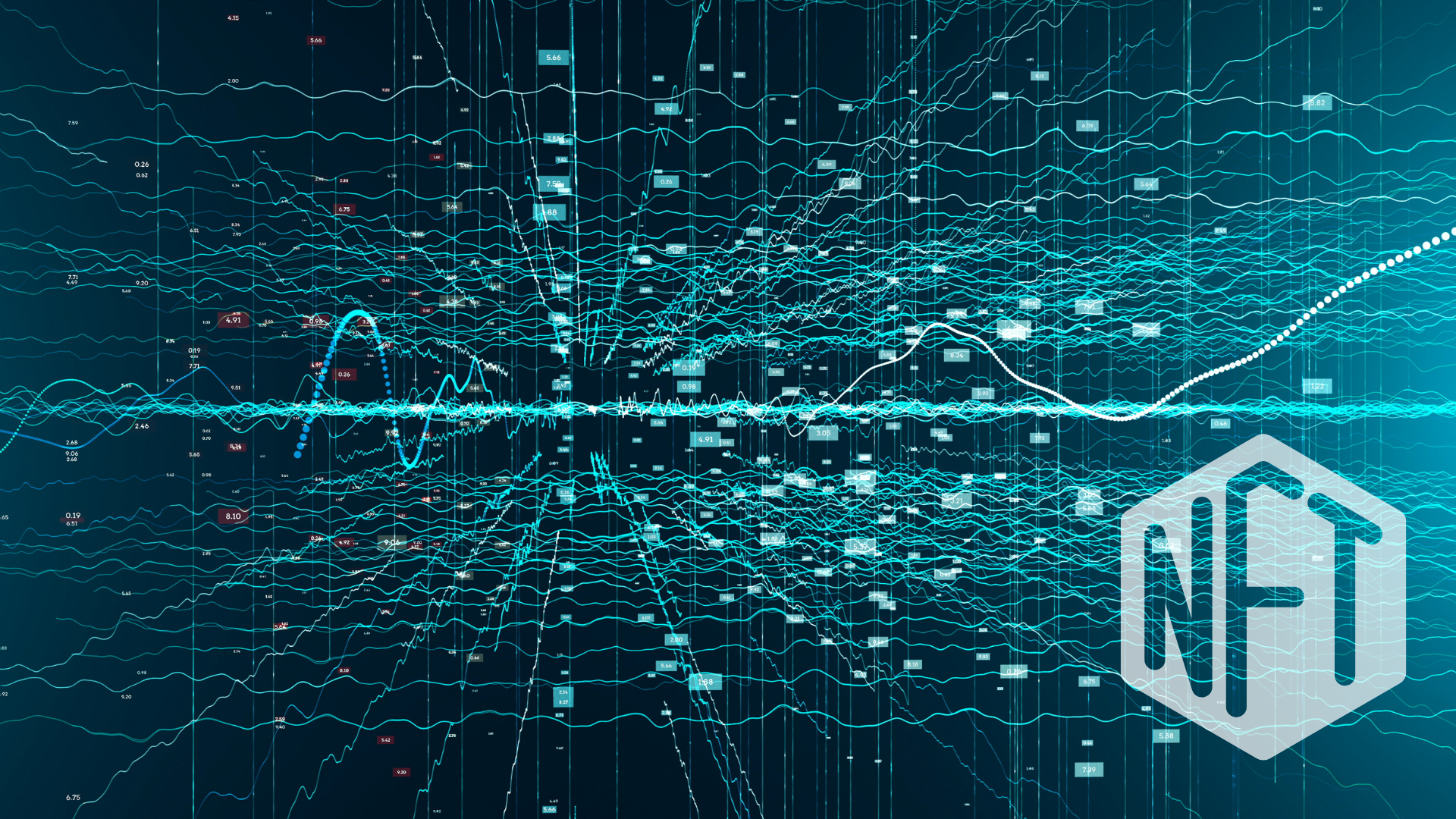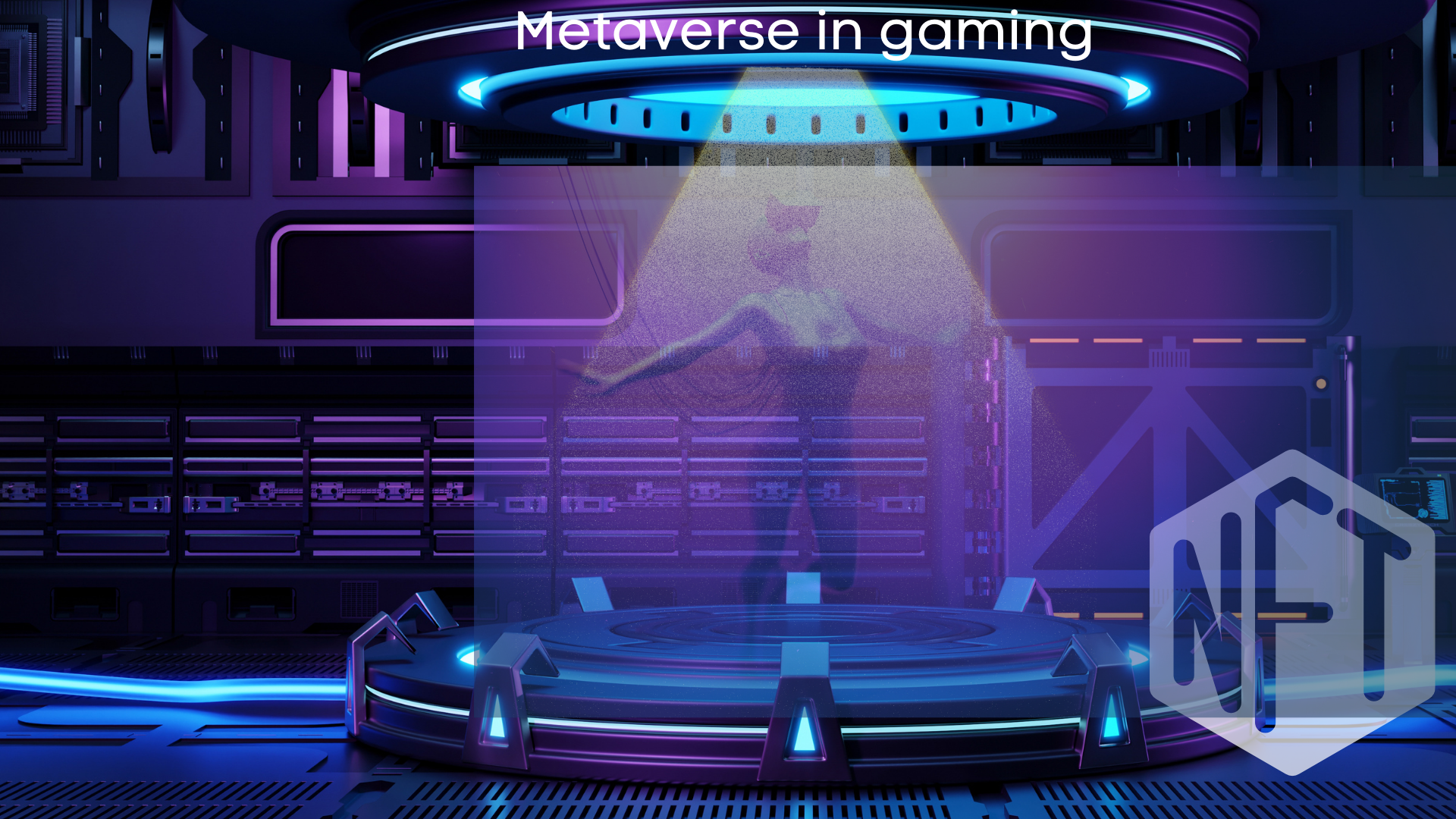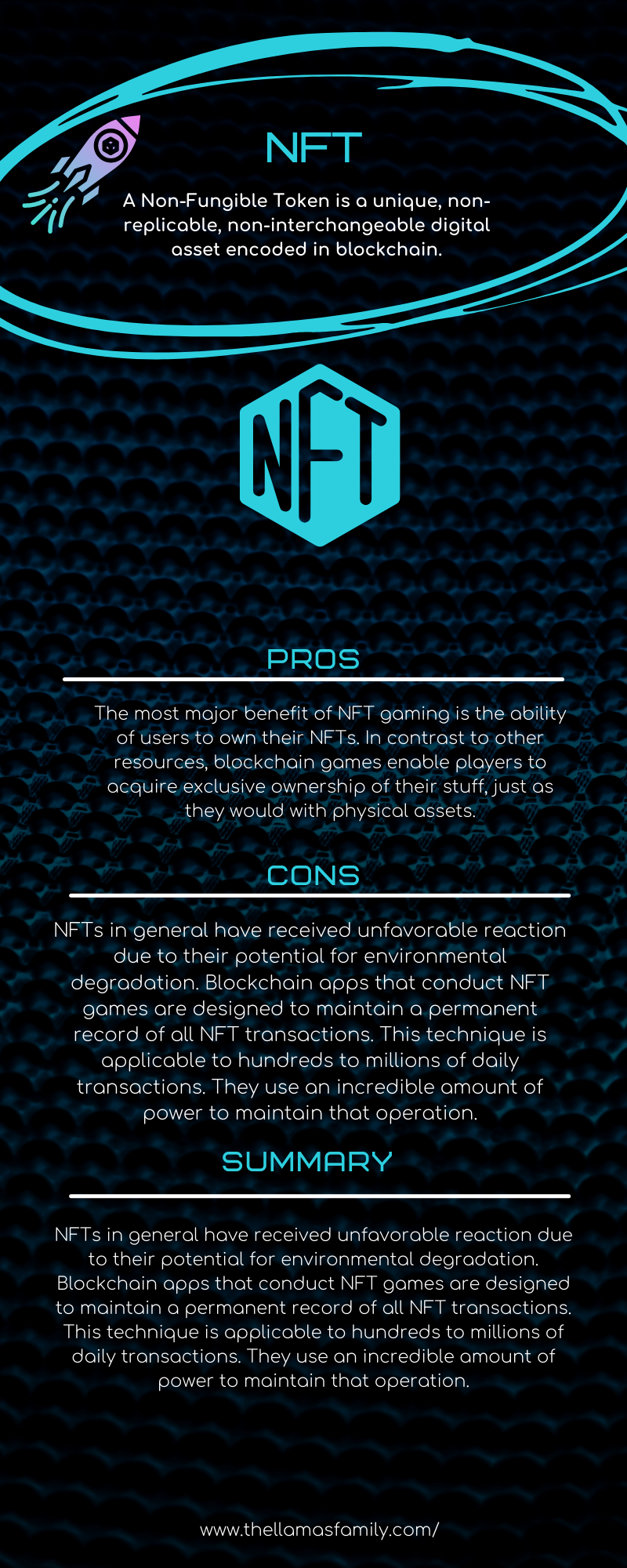Introduction
If you’ve spent time on the internet, social media, or Reddit in the last year, you may have come across the term Non-Fungible Tokens (NFTs). A Non-Fungible Token is a unique, non-replicable, non-interchangeable digital asset encoded in blockchain which can be bought and sold. In short, NFTs can be used to prove your ownership of unique items like art, videos, music, collectibles, or even property. Digital art collections like Bored Ape Yacht Club helped launch the popularity of NFTs and promote NFTs in the art trade as a profitable long-term investment.
Similar to the art community, the gaming industry makes use of NFTs as a way to boost their user economy and income. With increasing interest from both gaming companies and users, NFTs eventually exploded onto the gaming scene. From 2018 to 2021, revenue from NFT-related games came second after art. NFT games are projected to experience further growth in the coming years with more metaverse releases.
What is NFT gaming?
NFT games are cryptocurrency-based games that allow users to earn money. These games include breeding and merging virtual pets, collecting rare items and cards, and selling armor and weapons. Each item or pet has an equivalent cryptocurrency that can be cashed out. Additionally, these items may serve a purpose in the game. Unlike NFT art, which focuses on building out your collection and owning art, NFTs in games have unique characteristics that determine their function, rarity, and price.
If you're thinking about starting your NFT gaming career, keep in mind that your earnings will be determined by the game you play. Some games emphasize "grinding" (or "play-to-earn"), while others encourage "buy-and-sell." You’ll also run into games that demand players to invest in starters by paying upfront. With these types of games, users seek a host (or a sponsor) to meet their needs in exchange for a commission percentage based on their future in-game revenue.
Once you've decided which game you’re going to play, you'll need a crypto wallet to hold all of your NFT items and coins and allow you to use your cryptocurrency to trade on different NFT marketplaces.
Role of Metaverse in NFT gaming
Metaverse in NFT gaming is an online world that allows users to do different digital trades and activities. Players can enter the metaverse world using a virtual avatar to interact with co-players, engage in the greater community forum, and own intangible assets. Through metaverse, players from different places can participate in the broader marketplace and even sell their self-made NFTs. For example, Decentraland. Users, upon entering, will take form using a virtual avatar, which is the one who will engage in the world. This NFT gaming metaverse uses blockchain technology which allows for the creation, trading, and regulation of the NFT market. Metaverse tokens are also part of the blockchain system.
When buying merchandise in the marketplace, it is crucial to have a common currency like Metaverse coins and tokens. Games have currencies that players use to buy and sell items such as real estate, skin, and weapons. A few examples of Metaverse coins are SLP and AXS for Axie Infinite, MANA for Decentraland, and SAND Tokens for The Sandbox. Other than that, another cryptocurrency is Ethereum (ETH), which is the second grossing digital currency after Bitcoin. ETH is the most common currency across metaverses and will allow for easier NFT trading across games.
How to start NFT gaming?

To begin your NFT-earning journey, consider the following three steps. First, set up your crypto-wallet. This crypto wallet is where you will store all your cryptocurrencies and NFTs you want to trade in the future. They are decentralized – meaning you can handle your own assets however you wish without companies’ interference. Examples of crypto wallets are Coinbase, Binance, and Metamask. Second, choose a game to play. NFT are everywhere games on the market and finding a suitable game for your taste shouldn't be hard. Third, connect your crypto wallet to your game of choice and start earning! Your progress in the game and the profit you will get depend on your drive to make money. So to earn and acquire deals, learn the game and familiarize yourself with its market.
Examples of NFT Games:

There are many different NFT games to pick from! While most users get into NFT games to generate money, other users play NFT games because they have fun playing them. Whether you’re looking to try NFTs for monetary reasons or just for fun, here are some examples of NFT games to get you started.
Axie Infinity
Axie Infinity is currently the most well-known NFT game in the world! It’s often compared to the well-renowned Nintendo game Pokémon with a play-to-earn twist. Axie Infinity players begin by breeding and selling Axies (the in-game pets), which they then utilize in battles. Players who win duels will receive Smooth Love Potions (SLP), an in-game currency, and Axie Infinity Shards (AXS). SLP is mainly used to breed Axies and can be traded directly as a cryptocurrency. AXS, on the other hand, are governance tokens that allow players to take part in choosing the game’s future development by voting.
Sorare
Leaning to the sports side of NFT gaming, Sorare is a football fantasy card game. Fantasy managers or players can collect, trade, and buy cards to form their virtual team. They'll enter tournaments with their fantasy team to win more points and money. Collected cards also serve as NFTs and can also be sold as a cryptocurrency.
Decentraland
Decentraland is a 3D virtual realm containing real-world assets that exist in the metaverse. The game's major concept is world-building and players can purchase land and create their own districts. "Lands" are the NFTs in this game and they can be bought by and sold for MANA tokens. Like the SLP in Axie Infinite, MANA is a type of in-game currency.
The Sandbox
Sandbox is a game similar to the blocky style of Roblox and Minecraft. In contrast to other games, The Sandbox allows players to design their own items (assets) which are then converted into NFTs. Asset creators can sell their works in exchange for SAND tokens on the Sandbox Marketplace.
Gods Unchained
Similar to Hearthstone, Gods Unchained is a competitive card game with its own NFT spin. Players have full ownership of their cards and they can do whatever they want with them, including selling or trading them. Each card has its own cost and can be traded in-game with GODS tokens.
CryptoKitties
CrypoKitties may be just up your alley if you're a cat lover who wants to make money. Players can easily have virtual cats with a wide range of "cattributes" that they can take care of, thanks to the game's breedable and collectible game features. These virtual cats (cryptokitties) can be sold as an NFT and their price is based on their rarity. For instance, lower generation cryptokitties have a higher price tag than the new-gen. All you need to do is breed kitties to get rare cryptokitties, take care of them, and sell them on the marketplace to earn Ethereum (ETH).
DeFi Kingdoms
DeFi Kingdoms is another competitor of Axie Infinities in the play-to-earn sector. This game is a pixel adventure game with hints of Runescape vibes. Like classic adventure games, DeFi kingdoms use quests to earn rewards and introduce the heroes as its NFTs. Players can buy, sell and rent heroes in the marketplace using JEWEL tokens (DeFi Kingdom’s currency).
Splinterlands
Splinterlands is another play-to-earn trading card game. Unlike most NFT games that run on Ethereum, Splinterlands runs on the Hive blockchain and is still a popular choice among NFT gamers. Players can enter ranked tournaments using their deck of cards, and if they win, they will get rewarded with Dark Energy Crystals (DEC). DEC is the in-game currency of Splinterlands that allows users to upgrade cards, use it for buying and trading cards, and can be cashed out through a blockchain wallet such as Hive and Binance Smart Chain (BSC).
What are the pros and cons of NFT Gaming?
Pros
The ability of users to own their NFTs is the most significant advantage of NFT gaming. Unlike other resources, blockchain games allow users to take sole ownership of their items as they would their real-world assets. Furthermore, whenever a user sells or buys an NFT, the blockchain program will ensure that all transactions are recorded in the system to prevent fraud. The blockchain method also reduces the possibility of NFTs being replicated or counterfeited.
Aside from owning an NFT, the driving force of these games is purchase and profit. Since most apps introduce unique characters or designs, their rarity adds to the value of the NFT which spikes the prices higher if auctioned. Furthermore, creators of NFTs can receive royalty fees when their work is traded through the marketplace.
Play-to-earn games are also a viable option for earning money. Individuals who lost their jobs due to the pandemic may see NFT games as a way to get back on their feet. With the constant demand for NFT games, the NFT market is expected to grow in the coming years, especially with the recent debut of metaverse worlds and gaming partnerships. If the target is met, corporations and users will be interested in NFT, which will repeat the investment and profit cycle.
Cons
NFTs, in general, have been receiving negative feedback for their environmental damage implications. Blockchain applications that run NFT games are made to permanently account for any NFT transaction made. This system applies to thousands to millions of transactions that happen every day. To continue that process, they consume an incomparable amount of electricity, resulting in increased greenhouse gas emissions. Some NFT companies expressed their acknowledgment of the issue and promised to be more eco-friendly. Nonetheless, it is critical to maintain skepticism until a change is observed.
Gambling, financial instability, and high-risk investing are among the monetary risks of NFT gaming. Given that most popular games are pay-to-earn, it's no surprise that people risk their resources to win large sums of money. As an example, consider Axie Infinite. As previously said, a handful of people who wish to get into the game need sponsors to help them get started. This is because the initial investment for starting Axies is quite high. Furthermore, because players must win to earn SLPs, the return is not guaranteed as a precondition pay. This encourages users to spend an excessive amount of time trying to accomplish their daily monetary objectives.
Adding to the risks is the instability of the market. Cryptocurrencies still act as real-life currency that fluctuates depending on various circumstances. The conversion rates of metaverse coins, tokens, and in-game currencies rely on the economy of the game.

Conclusion
NFT games are one of the best ways to earn while at home. Many even see it as a viable source of income. Don’t be afraid to create or invest in art or music; find a game you like, play it, and have fun while earning! But, remember that knowing NFT games' mechanics before playing them is essential to avoid fraud and experiencing high losses.
Frequently Asked Questions (FAQ)
What does NFT mean for gaming?
NFTs could mean big things for the gaming industry, but it remains to be seen how they will be used. For now, they provide a new way for developers to monetize their creations and reward players for their achievements. NFTs could also help create more unique and rare virtual items that can be traded or sold on secondary markets. But as with any new technology, there are also potential risks and concerns that need to be addressed. We'll need to wait and see how NFTs evolve before we know their true impact on gaming.
How do NFT games make money?
NFTs, or non-fungible tokens, are rare digital assets that can be bought, sold, and traded on various online platforms. Some of these platforms are dedicated to NFTs, while others (like Coinbase) have recently begun listing them. Unlike regular cryptocurrencies, which are all interchangeable (i.e. one Bitcoin is worth the same as any other), each NFT is unique and therefore has its own value.
NFT games make money by selling off these valuable digital assets to the highest bidder. Depending on the game and the type of NFT being sold, prices can range from a few dollars to hundreds or even thousands! The key is to find an active market with plenty of willing buyers
What is NFT Digital Art?
NFT digital art is a type of digital artwork that is stored on the blockchain and uses blockchain technology. NFT digital artwork are pieces of artwork in a digital form. They can be bought and sold at an NFT marketplace where collections can buy NFTs or sell NFTs using a digital wallet or other blockchain technology currency, like Bitcoin or the Ethereum network.
What is a Digital Asset?
A digital asset is anything that exists in digital form and can be bought, sold, or traded. This includes everything from cryptocurrency and digital art to website domain names and online accounts. Digital assets are stored on the blockchain network, which is a distributed database that records all transactions chronologically. Digital Assets are sold at different marketplaces depending on what the digital file is. For example, NFTs are traded on popular NFT marketplaces where owners can browse NFT collections and buy NFTs using digital wallets like MetaMask.
What are Popular Non Fungible Tokens NFTs?
Some popular NFTs include digital art, music, and in-game items. Digital art can be bought and sold on NFT marketplaces like Foundation or SuperRare. Music NFTs are usually stored on the blockchain network and can be bought or sold using a digital wallet like MetaMask. Additionally, some of the digital art has the same value as artwork that are physical assets in the art world.
Why are NFTs so popular?
NFTs are popular because they offer a unique and novel way to experience gaming. They provide an immersive and interactive experience that is not possible with traditional video games. Additionally, they allow gamers to interact with other players in real time, which enhances the gaming experience. Finally, they are relatively affordable, which makes them accessible to a wider audience.
How do I create a NFT token?
There are a few ways to create an NFT token. The most popular way is to use an Ethereum smart contract, which allows you to create an ERC-721 token. You can also use other blockchain platforms such as Waves or NEO. To create an NFT token, you'll need to design your asset and decide what attributes it will have. Once you've created your token, you'll need to mint it on a blockchain platform. Finally, you'll need to market your NFT token and get people interested in buying it! Thanks for the question!
Can I earn money from NFT?
Yes, you can earn money from NFTs! Just like with any other asset, you can sell them for a profit if the market is willing to pay more for them than you paid. You can also use them to access exclusive content or services, or even just show off your wealth and taste. Of course, there's always the risk that the value of NFTs could go down, so it's important to do your research and only invest what you're comfortable losing. Still, if you're looking to make some quick and easy money, NFTs could be a great option!
Who are the owners of the nft on the blockchain in virtual worlds
The nft on the blockchain in virtual worlds are typically owned by businesses that provide services and strategy within those worlds. For example, online gaming companies often own nfts as a way to create exclusive in-game content and experiences for their players.
Other businesses that may own nfts include digital content creators, social media platforms, and advertising networks. By owning nfts, these companies can create unique assets and experiences that can be used to engage their customers and attract new users.
Are my nft rare digital items save in the nft blockchain
It depends on what you mean by "save". If you're asking whether the transactions on the blockchain are permanent and cannot be undone, using smart contract ,then the answer is yes. The data on the blockchain is immutable and cannot be changed.
However, if you're asking whether your digital assets are safe and secure using NFTs, then the answer is also yes. NFTs offer a high level of security and encryption, so your assets are safe from theft or fraud. In addition, using NFTs for asset management provides a number of benefits for businesses such as improved transparency, auditability, and traceability.
Can a NFT Become a Physical Assets ?
Most people think of physical assets when they think of investments, but there's no reason why a non-fungible token (NFT) couldn't become a physical asset. NFTs are digital objects that can be bought and sold like other virtual assets, but they're unique and can't be replicated. This makes them ideal for collectors and investors who are looking for something rare and valuable.
There are already a few examples of NFTs becoming physical assets. In 2018, an entrepreneur traded an NFT for a racing McLaren sports car. And last year, someone bought an NFT for a real-world estate in Decentraland, a virtual world built on the Ethereum blockchain.